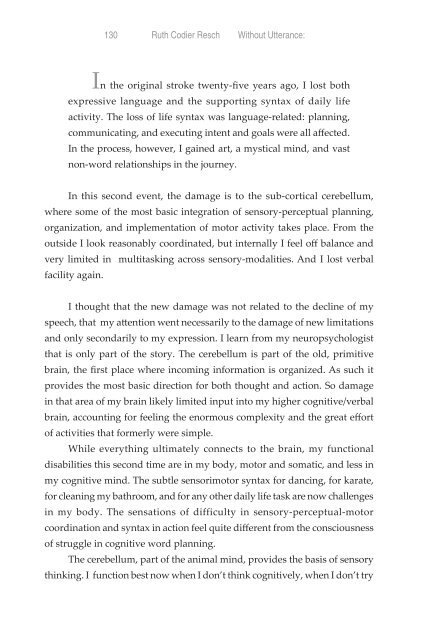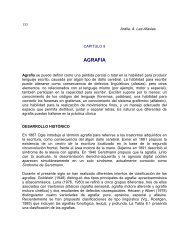the PDF of her book - National Aphasia Association
the PDF of her book - National Aphasia Association
the PDF of her book - National Aphasia Association
You also want an ePaper? Increase the reach of your titles
YUMPU automatically turns print PDFs into web optimized ePapers that Google loves.
130 Ruth Codier Resch Without Utterance:<br />
In <strong>the</strong> original stroke twenty-five years ago, I lost both<br />
expressive language and <strong>the</strong> supporting syntax <strong>of</strong> daily life<br />
activity. The loss <strong>of</strong> life syntax was language-related: planning,<br />
communicating, and executing intent and goals were all affected.<br />
In <strong>the</strong> process, however, I gained art, a mystical mind, and vast<br />
non-word relationships in <strong>the</strong> journey.<br />
In this second event, <strong>the</strong> damage is to <strong>the</strong> sub-cortical cerebellum,<br />
w<strong>her</strong>e some <strong>of</strong> <strong>the</strong> most basic integration <strong>of</strong> sensory-perceptual planning,<br />
organization, and implementation <strong>of</strong> motor activity takes place. From <strong>the</strong><br />
outside I look reasonably coordinated, but internally I feel <strong>of</strong>f balance and<br />
very limited in multitasking across sensory-modalities. And I lost verbal<br />
facility again.<br />
I thought that <strong>the</strong> new damage was not related to <strong>the</strong> decline <strong>of</strong> my<br />
speech, that my attention went necessarily to <strong>the</strong> damage <strong>of</strong> new limitations<br />
and only secondarily to my expression. I learn from my neuropsychologist<br />
that is only part <strong>of</strong> <strong>the</strong> story. The cerebellum is part <strong>of</strong> <strong>the</strong> old, primitive<br />
brain, <strong>the</strong> first place w<strong>her</strong>e incoming information is organized. As such it<br />
provides <strong>the</strong> most basic direction for both thought and action. So damage<br />
in that area <strong>of</strong> my brain likely limited input into my hig<strong>her</strong> cognitive/verbal<br />
brain, accounting for feeling <strong>the</strong> enormous complexity and <strong>the</strong> great effort<br />
<strong>of</strong> activities that formerly were simple.<br />
While everything ultimately connects to <strong>the</strong> brain, my functional<br />
disabilities this second time are in my body, motor and somatic, and less in<br />
my cognitive mind. The subtle sensorimotor syntax for dancing, for karate,<br />
for cleaning my bathroom, and for any o<strong>the</strong>r daily life task are now challenges<br />
in my body. The sensations <strong>of</strong> difficulty in sensory-perceptual-motor<br />
coordination and syntax in action feel quite different from <strong>the</strong> consciousness<br />
<strong>of</strong> struggle in cognitive word planning.<br />
The cerebellum, part <strong>of</strong> <strong>the</strong> animal mind, provides <strong>the</strong> basis <strong>of</strong> sensory<br />
thinking. I function best now when I don’t think cognitively, when I don’t try



